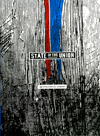State of the Union
The word “politics” comes from the Latin politicus and means, according to Merriam-Webster, “of or relating to government, a government, or the conduct of government.” It’s the conduct of government – George Bush’s government – that concerns most of the 50 poets collected here. Some are famous; some are new. All are accomplished and impassioned.
The word “politics” comes from the Latin politicus and means, according to Merriam-Webster, “of or relating to government, a government, or the conduct of government.” It’s the conduct of government – George Bush’s government – that concerns most of the 50 poets collected here. Some are famous; some are new. All are accomplished and impassioned.
Topics vary. Mathias Svalina’s “Forgiveness” addresses Darfur and the greater themes of forgiveness and apathy: “”Everyone knows the definition / of Darfur & yet in a / random poll of 200 Americans / only 12% would reach / their hands into the drainpipe / & pull the rotting / blue jay out.” Brian Turner gives us a unique perspective on Iraq in “Observation Post #71”: “Owls rest in the vines of wild grapes. / Eucalyptus trees shimmer.” Dave Brinks recalls the aftermath of Hurricane Katrina in “The Caveat Onus, Fifty-Five”: “the sun falls into the river / New Orleans was never here.” Marvin Bell presents a double entendre in his title, “Homeland Security,” in which he says, “Today I finger / each envelope before opening, and I admit / I feel for wires and beads of plastic explosive / amid the saliva.” And the focus of the always erudite and wonderful Albert Goldbarth is on war and its civilian casualties in “All totaled, the sunlight that strikes the earth at any moment weighs as much as an ocean liner”: “Another day when work crews in the rubble discover / the feet of a child – three years old, they guess – smashed / by a fallen lintel, as flat and dry by now / as two corsages from a tomb.”
Two titles, “Elementary Science for Dick Cheney” by Matthew Rohrer and Anselm Berrigan’s “The Autobiography of Donald Rumsfeld,” name names. In particular, Rohrer’s poem starts out as a clever imagining of how Cheney’s values were formed: “The fox / is not mean. / The bunny isn’t good.” But he drops this conceit for direct vitriol when he says, “It is you, the vice / president of our country, / who is despicable, / with your artificial heart / your rictus face /and your friends / mean and evil.” This is unfortunate. It reminds me of “Monster,” Robin Morgan’s unsuccessful diatribe against Ted Hughes in the wake of Sylvia Plath’s death. It feels as though Toto has pulled aside the curtain to show us who the Wizard really is when the business of poetry is wizardry.
Two poems stand out. Joe Wenderoth’s “Sitting in Traffic” is a quiet, deceptively simple elegy about “those yellow-ribbon bumper stickers” that urge us to support U.S. troops overseas, stickers that, years after the wars in Afghanistan and Iraq have begun, are “all faded / and it’s hard to make out the words.” What’s left is “whatever it is that moves us / no closer to knowing.”
The best poem in the collection is Lucille Clifton’s haunting “september song: a poem in 7 days.” It begins on September 11th (“no day / will ever be the same no blood / untouched”) and ends on Rosh Hashanah. In the interim, the speaker’s granddaughter is “born into a violent world / as if nothing has happened.” She wonders on September 14th, “is it treason to remember / what have we done / to deserve such villainy.” The answer comes quietly: “nothing we reassure ourselves / nothing.” In the end, we must be grateful for what we have, for “what is not lost / is paradise.”





